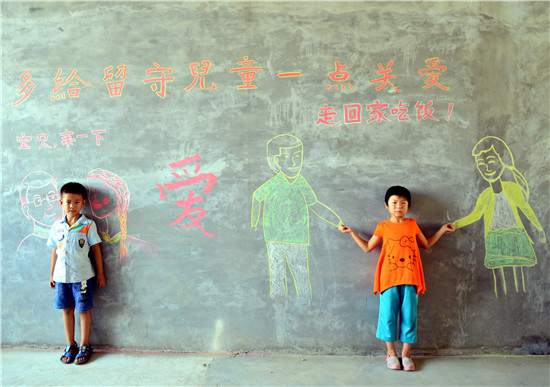


[File photo]
Authorities in Nanchang, Jiangxi province have issued a new scheme to protect left-behind children, stipulating that parents who are migrant workers cannot leave children under 16 to live by themselves.
The plan, which aims to establish a protective system for left-behind children in rural areas, encourages migrant workers to take their children with them when they migrate. For those who cannot live with their children, a qualified guardian must be appointed to care for the kids.
The local government will also create a personal file for each of the left-behind children in an effort to keep track of their lives and offer them necessary aid. The government plans to establish more care centers, which can offer such children services including psychological counseling and day care.
The term "left-behind children" refers to rural children under 16 whose parents are migrant workers, or those with one migrant-worker parent and one parent incapable of guardianship. Currently, there are over 9 million left-behind children in China, according to China’s Ministry of Civil Affairs (CMA).
The separation of children from their migrant-worker parents has created a number of social issues. In June 2015, four siblings in southwestern China’s Guizhou province died after drinking pesticide. Three of the children were under 10. Their mother had left the family, and their father had migrated for work. The children lived without a guardian for about two years.
Meanwhile, the Chinese government has been making earnest efforts to tackle the problem. According to CMA’s 2016 annual report, there were 560,000 fewer left-behind children in 2015 than the year before. More children had also migrated together with their parents, thanks to favorable policies including easier access to schools in urban areas.
 Fire brigade in Shanghai holds group wedding
Fire brigade in Shanghai holds group wedding Tourists enjoy ice sculptures in Datan Town, north China
Tourists enjoy ice sculptures in Datan Town, north China Sunset scenery of Dayan Pagoda in Xi'an
Sunset scenery of Dayan Pagoda in Xi'an Tourists have fun at scenic spot in Nanlong Town, NW China
Tourists have fun at scenic spot in Nanlong Town, NW China Harbin attracts tourists by making best use of ice in winter
Harbin attracts tourists by making best use of ice in winter In pics: FIS Alpine Ski Women's World Cup Slalom
In pics: FIS Alpine Ski Women's World Cup Slalom Black-necked cranes rest at reservoir in Lhunzhub County, Lhasa
Black-necked cranes rest at reservoir in Lhunzhub County, Lhasa China's FAST telescope will be available to foreign scientists in April
China's FAST telescope will be available to foreign scientists in April "She power" plays indispensable role in poverty alleviation
"She power" plays indispensable role in poverty alleviation Top 10 world news events of People's Daily in 2020
Top 10 world news events of People's Daily in 2020 Top 10 China news events of People's Daily in 2020
Top 10 China news events of People's Daily in 2020 Top 10 media buzzwords of 2020
Top 10 media buzzwords of 2020 Year-ender:10 major tourism stories of 2020
Year-ender:10 major tourism stories of 2020 No interference in Venezuelan issues
No interference in Venezuelan issues
 Biz prepares for trade spat
Biz prepares for trade spat
 Broadcasting Continent
Broadcasting Continent Australia wins Chinese CEOs as US loses
Australia wins Chinese CEOs as US loses